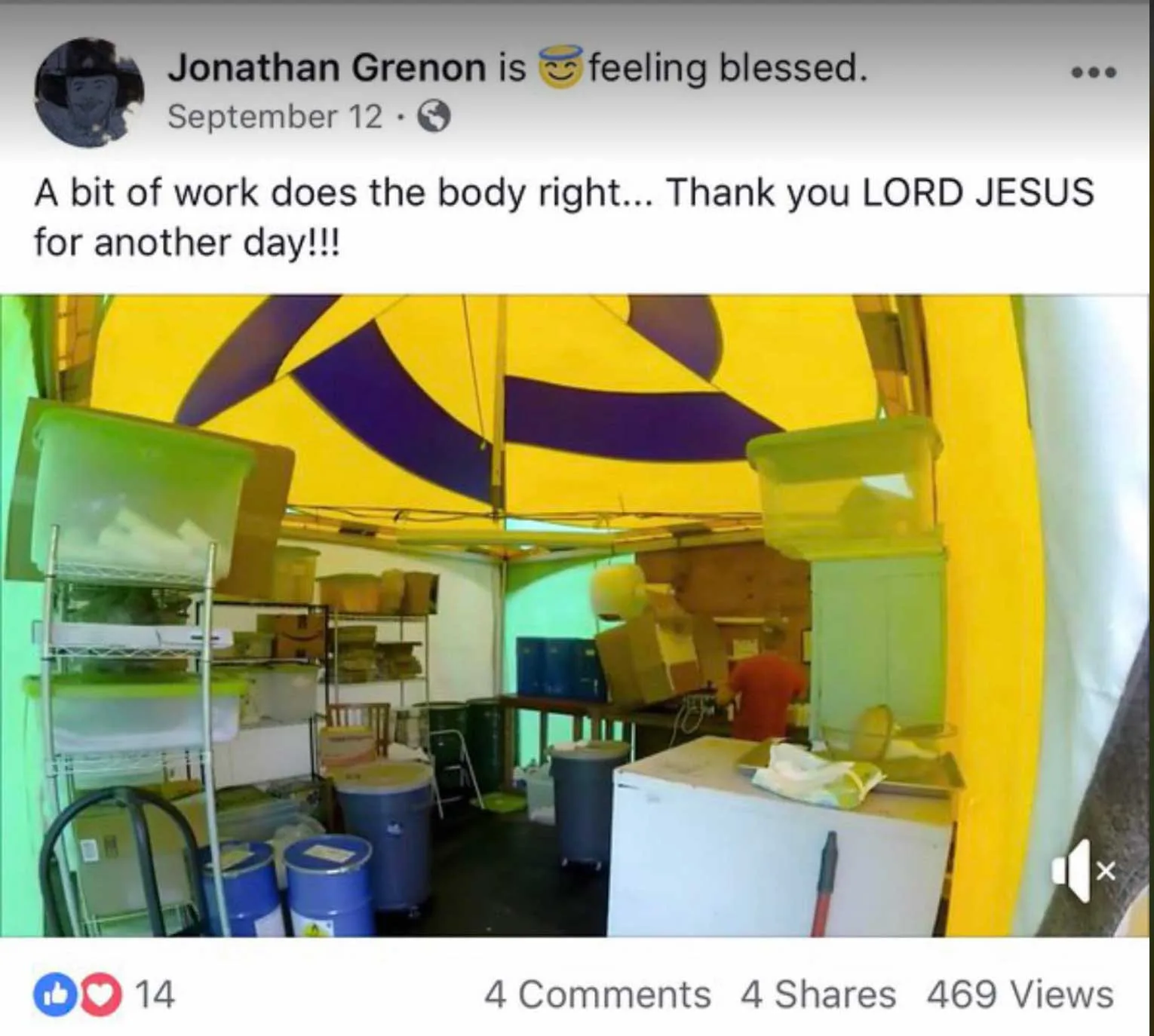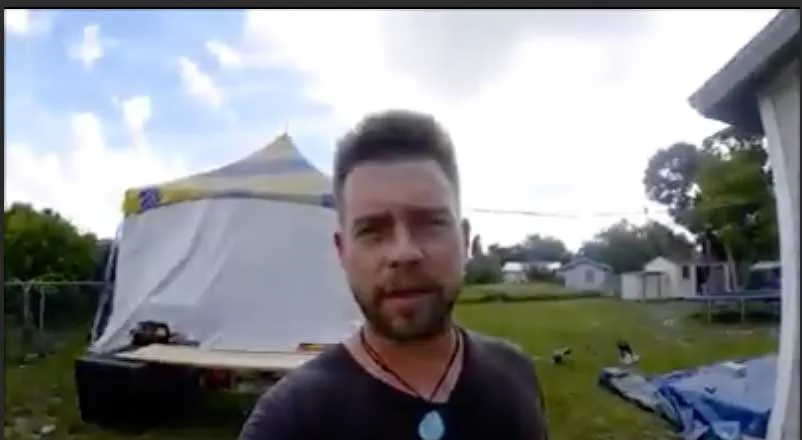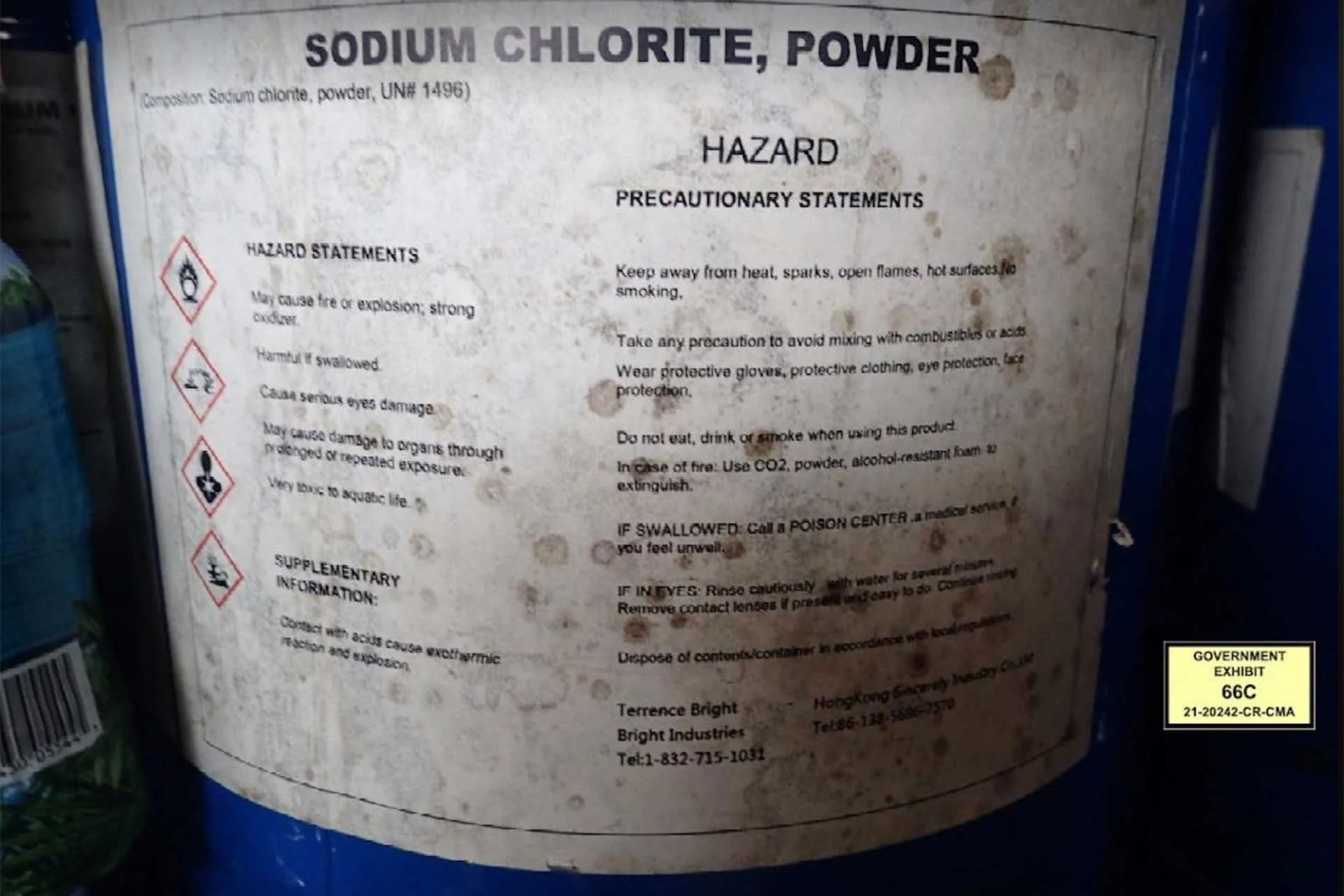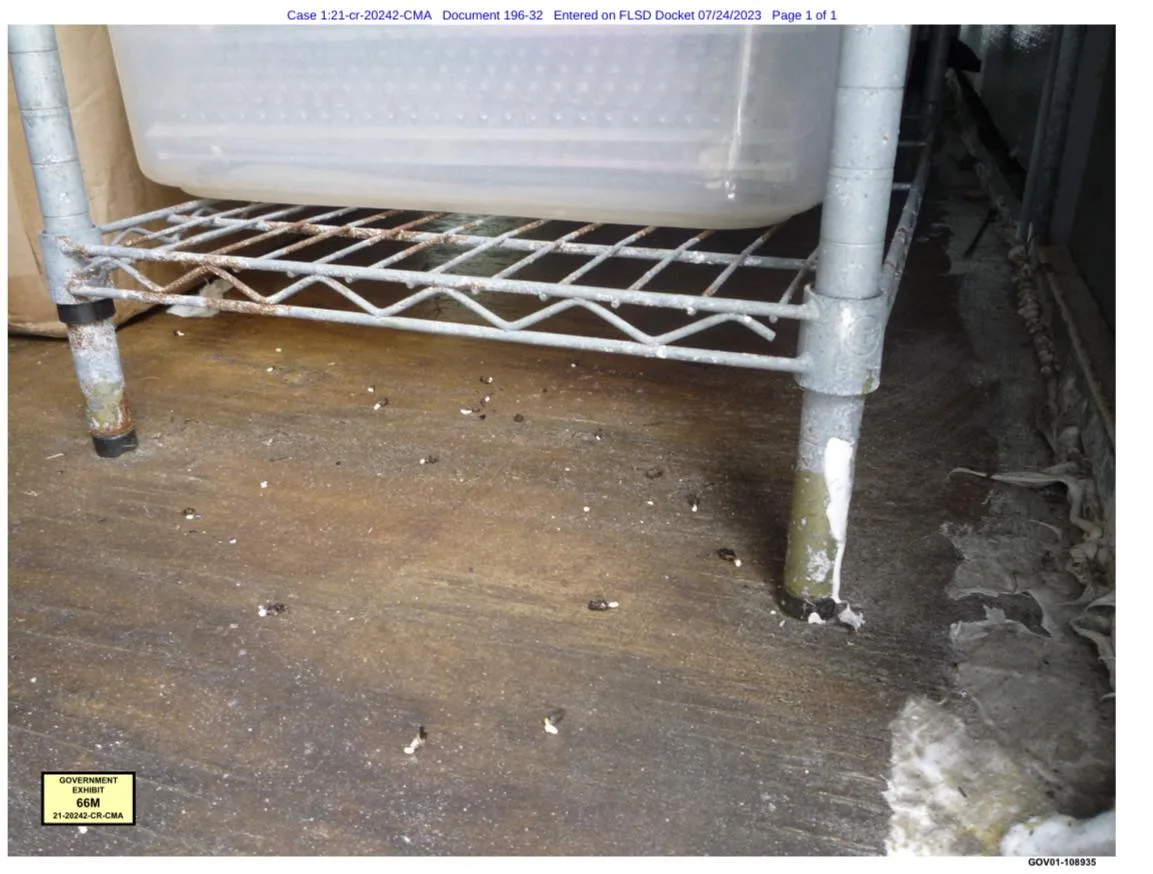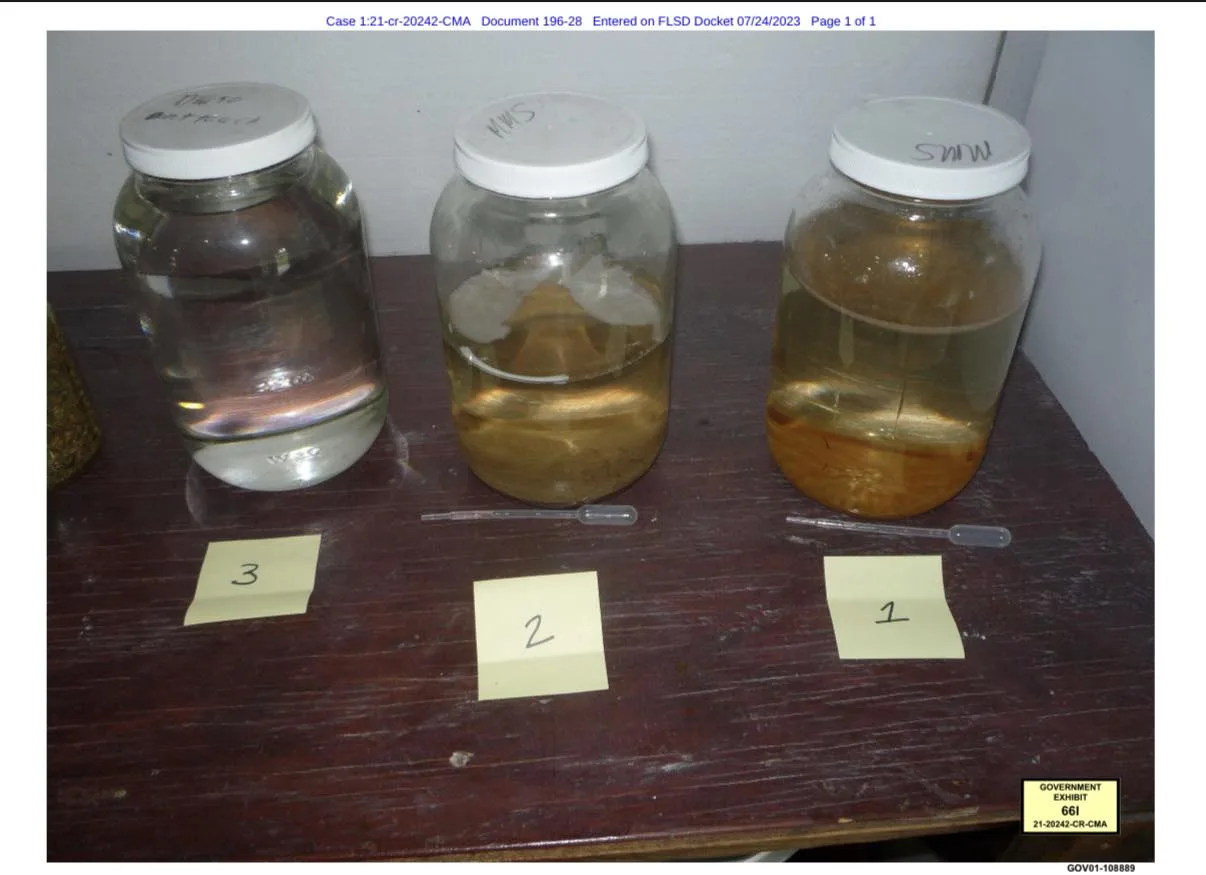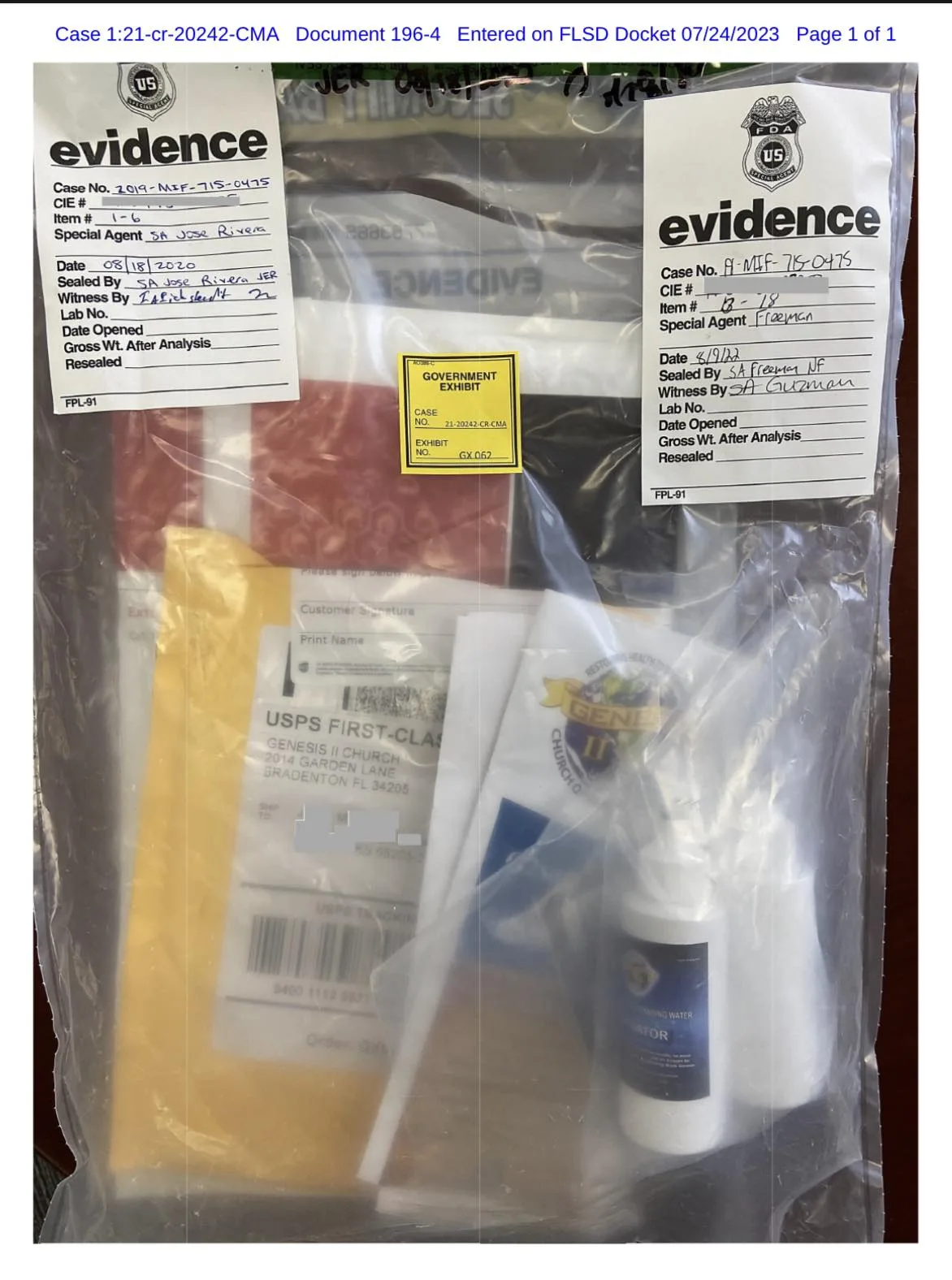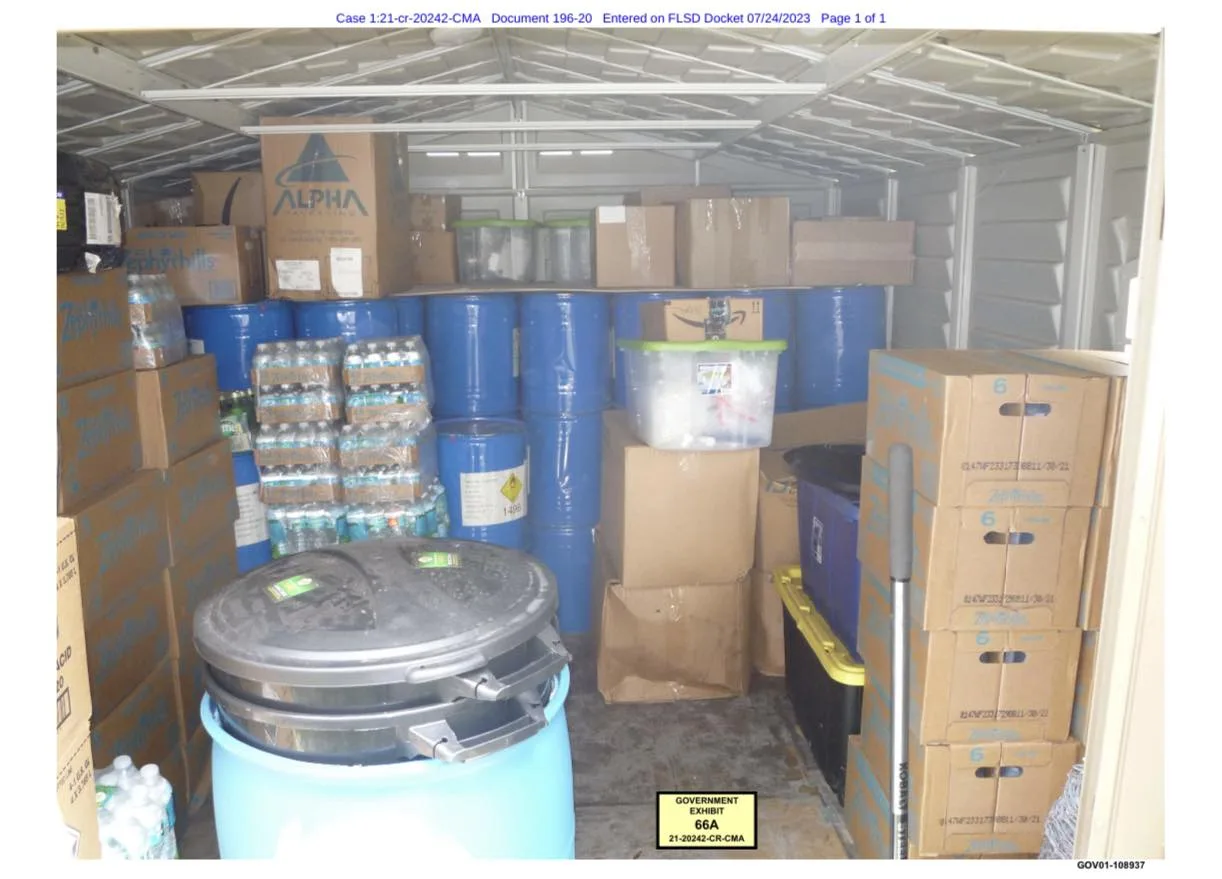“I am a Bishop of the Genesis 2 Church and you are harassing me. This is a sovereign church right here. … We’ve written the President. Jesus Christ is Lord and he is going to come back and he is going to save us from this evil empire!”
So shouted Jonathan Grenon to U.S. federal agents serving papers in May of 2020, demanding his company comply with previous orders to stop making and selling MMS, a bleach product that the Grenons had been telling people to ingest as a phony treatment for cancer, AIDS, autism and Covid, among other conditions.
Jonathan, his brothers Jordan and Joseph and his father Mark were leaders in Genesis 2, a so-called “church” that sold Miracle Mineral Solution (MMS). They’ve made millions in sales despite the fact that their product—a bleaching agent that is normally used in textile and paper production—has caused illness, hospitalizations and deaths when consumed.
The Grenons first produced MMS in a shed, then a tent and finally in Jonathan Grenon’s garage in Bradenton, Florida. In a since-removed promotional video (shared on Facebook by an account called “Genesis 2 #77” in 2018), Jonathan Grenon walked viewers through the yard with a view of all the structures, ending at a garage filled with storage boxes, plastic barrels and paraphernalia for producing their product.
“Thank you Lord for what you’ve done to continue helping us to grow to reach others,” he intoned. “It’s a little something that can change the world, people. A little shed. Remember, Jesus was born in a manger. A lot can be done in small places.”
The video is all that’s left since May of 2020, when authorities came calling. Law enforcement destroyed 50 gallons of muriatic acid, 22 gallons of MMS and 8,300 pounds of sodium chlorite. Jonathan and Jordan Grenon were arrested that day for defying court orders to shut down the business. Mark and Joseph were later found and arrested by Colombian authorities near Bogota.
Three years after their arrests, the Grenons went to trial in July of 2023. They were convicted on four counts of conspiracy to defraud the United States and deliver misbranded drugs. Mark and Joseph were also convicted on two counts of criminal contempt.
The trial was over in a few days, with the jury deliberating for just five minutes. U.S. District Judge Cecilia Altonaga delivered the ruling as the Grenons sat silent, as they had throughout the trial, looking vaguely Nazarite in the shoulder-length hair and beards they had grown during their time in jail.
According to prosecutors, the Grenons—who refused legal counsel—had admitted to leveraging claims of being a “church” in an attempt to avoid prosecution for selling poison as a health product. They cited meetings where the Grenons gave examples of being able to sell MMS due to their company’s status as a religious entity. Aviva Seigler, an activist who has researched Genesis 2 for five years and gave a trove of information to FDA investigators, believes the Grenons’ incorporation of Genesis 2 as a church served two purposes.
“One, it granted them tax benefits in the US,” Aviva told me. “Two, the group lists MMS as a religious sacrament, which they thought could protect them. Genesis 2’s founder Jim Humble even said that it has nothing to do with religion. He co-founded Genesis 2 as a church to try to legalize the use of MMS.”
According to the 2023 indictment, religion was even incorporated into the payment methods when people purchased MMS online. “Although these websites stated that MMS could be acquired…through a ‘donation’ to Genesis, the donation amounts for orders of MMS were set at specific dollar amounts, and were mandatory, such that the ‘donation’ amounts were effectively just sales prices.”
FDA documents show that prior to 2020 the company claimed MMS could treat cancer, Alzheimer’s, diabetes, autism, malaria, hepatitis, Parkinson’s, herpes and HIV/AIDS and had sold to thousands of Americans. Prosecutors noted the Grenons also promoted MMS as a Covid cure online, including a March 2, 2020 podcast entitled: “The Coronavirus is curable! Do you believe it? You better!”
Before their arrests, 2020 had been a good year for Genesis 2. According to IRS documents, the company had earned $500,000 in all of 2019, but it earned $123,000 alone in the month of March 2020. Ignoring years of FDA warnings, as well as a temporary restraining order and a preliminary injunction, the Grenons continued to produce and ship their product (with some sales, unbeknownst to them, being received by U.S. agents building a case). Then in April, the Grenons wrote to a presiding judge and attorneys for the United States that they would not obey government orders to cease production.
“We are practicing ‘civil disobedience’ against this unjust order!” read the letter, signed by the father and three sons. “Civil disobedience is permitted in the US Constitution peaceably of course at first if possible . . . .NOTE: The 2nd Amendment is there in case it can’t be done peaceably . . . . The Genesis II Church of Health and Healing will not stop . . . providing [MMS] to the world!”
What exactly led up to that fateful day in Bradenton? How had Genesis 2 managed to convert believers and earn millions by selling bleach for consumption, for more than a decade? And what was the journey that finally led to the Grenons’ conviction?
“A God From Another Galaxy”
To understand the saga of Genesis 2, we need to go back to 1996 when Jim Humble began marketing MMS (which he first claimed could cure malaria) while on an expedition for gold in South America. Humble eventually traveled to Africa on a missionary-style venture, explaining to followers that he was a billion year old god from the Andromeda galaxy (“…And then I asked to be put in the part of the space navy that watched over the Earth,” reads part of his video backgrounder.) Humble claimed that his product, made from bleach and water, had been “proven to restore partial or full health to hundreds of thousands of people.”
Marketing to families of individuals with serious health conditions has been part and parcel of the operation according to Emma Dalmayne, a U.K. mom who has been leading a campaign to stop MMS. Dalmayne’s work eventually helped lead to a Parliamentary report about the need to build solid regulation against disinformation. Dalmayne, along with Seigler and Melissa Eaton, all moms of children the same age as many being forced to take MMS to “cure” their autism, have worked with other activists globally to infiltrate closed social media groups selling MMS.
The loosely-organized group has been sharing tips and files with law enforcement authorities and health regulators, information that has helped in numerous raids and arrests in Europe, South America and North America.
“While the victims can be any age,” Eaton told me, “parents of children with disabilities have always been targeted, as are the elderly and people with incurable conditions. They are often on fixed incomes and they invest what little they have in the promises the Grenons make them about the ‘miracle’ of MMS.”
Eaton, who has gone deep into the online support groups, describes witnessing very elderly people investing their hope and faith in the product, which prosecutors’ photos showed was being bottled in a room with animal feces at the edges of the walls. The product, which caused jurors to recoil when open bottles of it were passed around at the 2023 trial, held a sense promise for people who had given up hope.
This false hope was often delivered to patients on their smartphones, via social media, as they searched late into the night for relief from their suffering.
A major market for MMS has been parents of autistic children, recruited through Facebook support groups. At a time when a parent feel isolated and desperate, these online communities offer the promise of support—but with strings attached. To have access to the supportive community, they first have to believe in the product.
Another key to Genesis 2’s early sales success was a burgeoning online sales market, especially on social media. Humble and Co. built a chapter-based, MLM style of marketing, drawing in not just the sick and vulnerable but also a class of worker bees to spread the business far and wide. Stay-home moms and workers rendered redundant in a post-industrial America could become deacons of the “church” and make money selling the product, after attending a seminar led by so-called church leaders.
In 2010, Humble joined with Mark Grenon to expand Genesis 2 Church of Health and Healing. As a 2016 expose by ABC 7 Los Angeles revealed, the Grenons were holding seminars at hotels, charging hundreds per attendee, to promote their product.
“We’re curing people of major stuff,” Grenon said, “Just with the one drop an hour, from prostate cancer to brain cancer to autism.”
He then added: “Everybody start a church and do it from there. You can sell them anything! Tell them Jesus heals you while you drink this.”
Eaton explained that many chapters were started up from the seminars, which were held worldwide. It is a playbook followed by countless snake oil salesmen that often target parents of disabled children, digging them further into the scam with financial incentives.
“A lot of their success has been from this multi-level marketing style, where parents promote and share them in autism support groups,” she explained. “Moms are pulling other moms to these groups, inviting them in…‘well try this product or this product’ or ‘join this group’. Some of these moms even run autism pages, and companies give them a discount code that earns them free product or income.”
One problem that Eaton has identified is the rapidly-shifting nature of sales in online markets. Many of the U.S. Food and Drug Administration’s tracking methods were designed to find mistakes and misleading claims in the brick and mortar environments of production facilities and shops. It may be, Eaton told me, that “our agencies aren’t prepared for a world with chat rooms, Telegram and MeWe and all of the different platforms.”
“Who is monitoring all the digital storefronts, when there are so many of them?” she asks. “And do [authorities] know how to access them?”
Dealers try to evade detection online and also try to use legal loopholes to continues sales and avoid taxes, such as Genesis 2’s religion loophole—which, in the end, did not work out. U.S. prosecutors argued in their 2023 case that Genesis 2’s claims of being a religious institution were merely a ruse. Doug Nash, whose wife Sylvia died after consuming MMS, summed it up when describing the company’s claims of a spiritual connection. To Nash, Genesis 2 is not a church at all, but simply “a money-making operation.”
Activists Raise the Alarm
The earliest online activism related to MMS was inspired more than a decade ago in Wales, by Rhys Morgan. In 2010, Morgan, then a 15-year-old suffering from Crohn’s Disease, noticed “a disturbing undercurrent of people trying to push alternative medicines” in the online patient forums he visited.
Morgan began digging and found several FDA and Health Canada warning letters to MMS sellers. He then persuaded trading standards officers and then the Food Standards Agency (FSA) to issue a continental warning and put United Kingdom councils on alert about the issue. He also went to the media to educate the public about the dangers of MMS. Morgan’s actions earned him the James Randi Award for Grassroots Activism in 2010.
Emma Dalmayne, also in the U.K., stumbled on MMS within a parent group for parents of neurodivergent children. She contacted policymakers, which eventually led to the involvement of the Westminster Commission on Autism, who issued a report on autism misinformation in 2018. She also worked to get media attention, with the hopes of putting pressure on regulators to pass laws that supported the reports and data on the problem of health misinformation. But it was an uphill battle.
“I’d phone the papers up and say, ‘I’ve just reported a parent for using bleach on their child,’ and they’d be like what? It took a long time to make people actually take it seriously, especially when I’d say ‘in an enema.’ It was too unbelievable. I got hung up on, people weren’t willing to listen.”
Eventually media did tune in, starting with the tabloids, then mainstream press in the U.K. Unwilling to wait for better regulation and crackdowns on sellers, Dalmayne, who created a fake online profile of a mom named Anna Smith, also went directly to police. As The Guardian reported, Dalmayne had to change her profile name “when group administrators noticed people ‘Anna’ had been speaking to were being contacted by the police.”
In the US and Canada, efforts to combat MMS were scattershot. In 2010, the year Genesis 2 really took off, the FDA issued a consumer warning on its website. These kind of warnings would eventually support an arrest in 2015 by the State of Washington, where law enforcement gathered enough evidence to sentence Daniel Smith to 51 months in federal prison for online sales of MMS in the wake of the death of Sylvia Nash, who had used MMS.
It was progress, considering her husband Doug Nash’s recollection of the response from local Australian police when he reported her death to them. They did not even interview the sailors who sold Sylvia Nash the MMS, and he had to watch as the sellers defended their product online with the support of the MMS community.
”Police enforcement is … I don’t know what to say. It’s just not very well done,” Nash told the Sydney Morning Herald in 2010.
Nash continued to advocate and educate against the use of MMS, drawing the ire of Jim Humble, who accused the widower of trying ”to destroy a chemical that is probably at this time the most important chemical that mankind has.”
Health Canada had been issuing warning letters to sellers and statements to consumers on its website since 2010, but one Genesis 2 seller in particular evaded them for years. Finally, MMS dealer Stanley Nowak was approached in 2012 by Health Canada and, after the CBC discovered that Nowak was continuing to sell MMS in 2018 Nowak was found guilty on 17 counts related to fraud.
Meanwhile, online activists had begun to more systematically scan social media groups and flag MMS content by reporting it to hosting platforms like Facebook. Yet MMS-related posts were seldom taken down by the platforms, perhaps in part because it just wasn’t profitable for the companies to remove content that brought in ad revenue and engagement. As tech writer Charles Arthur, author of Social Warming, describes it, social media runs on an advertising model where “attention means money.” Even when safeguards were put in place, Facebook itself has acknowledged that pseudoscience content has run for months undetected since its main ad-screening system is automated, with Artificial Intelligence often reviewing flagged content, instead of staff.
As advanced as AI is, it clearly misses a lot of nuance. But then again, so do people.
Preying on the Desperate
As Cécile Guerin has written in Wired, much health misinformation is happening in spaces that regulators and even researchers have trouble accessing, such as private Facebook groups and group chats. There are numerous online support groups for parents of autistic children where dealers hawk their fake products—often in an echo chamber, as the groups themselves are run by company representatives.
During my research inside the social media groups the past three years, I’ve been offered countless products like illegal stem cells and medical tourism packages, all sold against FDA regulations. In May of 2023, I was offered a Zoom session with a British Columbia naturopath who had been banned months earlier by Canadian authorities from selling his products. The offer came in an online conversation with another “mom” who seemed to be representing the company and would advise people in the group: “DM me.”
That same month, I inquired in another group about a vomit-colored solution being sold in plastic water bottles that supposedly could cure autism, AIDS and more. Rather than blatantly engage in sales on the group’s page, dealers invited me to DM them, where they then shared information on how to order the product.
This type of stealth sales is also an increasingly common strategy for MMS dealers, with the hope they can remain undetected by investigators—or by keywords plugged into platform AI. The quasi-private space of WhatsApp, for example, is a trading post for various MMS sellers according to Eaton. On a phone call just after the trial verdict, both Eaton and Seigler told me that while they had been able to infiltrate WhatsApp chats and gather evidence for authorities, this kind of work may not be in the sights of regulatory institutions, who may not have clear policy to guide them in these new spheres.
Eaton is also concerned about how well-informed social services and local law enforcement are about MMS and other products like it, pointing out that they too can be vulnerable to online claims. She described a case in 2019 where the police were called on a parent who had been using MMS enemas on their young child. The parent showed the officers YouTube videos of MMS promoter Kerri Rivera claiming to be a doctor and endorsing MMS. That day, the police failed to intervene. As Brandi Zadrozny reported for NBC, local police, the state’s division of adult protective services and a medical doctor treating the child all declined to take protective action.
“They were convinced by a YouTube video,” Eaton said. “There’s clear evidence of a crime that they’re using industrial bleach and [the police] have the product in their hand, but the mother is able to convince them to go away, with a YouTube video.”
The danger of MMS remains clear. From 2015 to 2020, poison control centers managed more than 16,000 MMS/bleach-related cases, with around 2,500 involving children. But activists I spoke with believe there are more cases, showing me screenshots from online MMS groups run by supporters of MMS promoter Kerri Rivera. Chillingly, when parents reported that their child was bleeding or sickened by the treatments, Rivera and group administrators would claim it was a positive sign (“herxing”) and try to dissuade parents from taking their children to the Emergency Room.
In 2019, NBC reporter Brandy Zadrozny quoted from the support groups:
“‘My son is constantly making a gasping sound,’ posted one Kansas mother who claimed to treat her adult son with chlorine dioxide… ‘He won’t open his mouth,’ a Canadian mom wrote of her 2-year-old’s unwillingness to drink the chlorine dioxide. ‘He screams. Spits. Flips over.’”
Reading these horrifying accounts, it’s no surprise activists began pursuing other routes than complaints to platforms or even to regulators. When they saw posts about children suffering health consequences from MMS, some activist went rogue, finding contact information for parents and reporting them directly to local child welfare authorities or to an employer or ex-spouse who might take action.
In the late 2010s, the neurodiversity movement was also becoming more active in stopping MMS, with autistic advocacy groups such as Autistics for Autistics (A4A) reaching out to health providers in their role as mandatory reporters of child abuse. In 2018, A4A created a guide for physicians (which I co-authored) to educate medical professionals about what to do if their patients were victims of MMS and other abusive autism “cures.” But these desperate measures, undertaken by a skeleton crew of volunteer activists, weren’t going to be enough to stop MMS, especially without cooperation from social media companies.
Then, the pandemic came along.
The Pandemic Effect
In the early months of 2020, the pandemic accelerated Genesis 2’s reach. At the same time, U.S. authorities were continuing to put pressure on the Grenons, ordering them to cease production and sales of MMS. Mark Grenon penned a letter in May of 2020 in which he petitioned President Donald Trump and Attorney General Bill Barr to help promote the cause of MMS. He even claimed on video to have a call scheduled with the President.
But the Attorney General’s office was investigating Genesis 2, leading up to the arrests that same month. As to Trump, the story took an unexpected turn when the President introduced the idea of bleach as a Covid treatment in a press event, opining that an “injection“ of disinfectant into the human body could help stop Covid. As an increasingly uncomfortable-looking Dr. Deborah Birx, the administration’s coronavirus coordinator, looked on, Trump said:
“And then I see the disinfectant, where it knocks it out in a minute. One minute. And is there a way we can do something like that, by injection inside or almost a cleaning? Because you see it gets in the lungs and it does a tremendous number on the lungs. So it would be interesting to check that.”
Although Trump walked back his comments, some Poison Control Centers received an uptick of calls about whether bleach could be used as a Covid treatment. At a time when misinformation was center stage on all our devices and information about Covid itself was constantly evolving, many were confused about who was an authority on the disease and who had the truth.
“I can’t believe I have to say this,” tweeted former Vice President Joe Biden “but please don’t drink bleach.”
In April of 2020, in response to pandemic concerns, Facebook pledged to add a “pre-bunking” warning label to Covid-related ads and to remove reported ads that contain Covid pseudoscience. Since then, Facebook has also pulled down English-language content that was MMS-related, but Spanish content is still prevalent on the platform—deeply concerning, as Spanish-speaking North and South America are major markets for MMS, with dealers like Andreas Kalcker having sold chlorine dioxide for ingestion and injection. As well, products like stem cells and fecal transplants are still being sold as autism cures on the platform.
In recent months, Meta, which owns Facebook, has announced that its efforts to curb health disinformation have been scaled back as the pandemic has come to an end. But although the virus has retreated, the problem of disinformation hasn’t. On my call with them, Seigler and Eaton both expressed their fears that since the intensity of public health efforts around Covid have waned, so will the resources and energy that had been put into stopping health misinformation.
During the pandemic, we also saw a migration of MMS sellers to smaller platforms with no restrictions, such as Telegram and Brighteon, where bleach promoter Kerri Rivera maintains several groups, even after her offices were raided in 2021. With no clear regulations and increasing access to video streaming on the platforms, their products can be sold via a podcast pitch and a shared email address, which, according to court documents, the Grenons had been doing until their arrests. Once jailed, the pitch continued, as Mark Grenon found his way to a cell phone, continuing to access unregulated social media channels to promote the product.
The garage lab and sales office were dismantled that day in May of 2020, but the social media marketing machine was not.
The Trial in Miami: Substance Over Spectacle
From the outset, U.S. prosecutors seemed determined to pre-empt a circus atmosphere at the criminal trial, which was held at a U.S. federal courthouse in Miami, the same Florida venue used for legal actions involving former President Trump in recent months. After their arrests, the Grenons had tried several strategies to avoid prosecution, including destroying their birth certificates and claiming “sovereign” status and talk about challenging the constitutionality of the trial.
There appeared to be potential for lengthy proceedings that could have ended prematurely without a resolution—and the possibility that the safety and integrity of the legal process could be jeopardized. According to the Government’s motion, in earlier Genesis 2 podcasts, Mark and Joseph Grenon had, “threatened to ‘pick up guns’ and instigate ‘a Waco’ should the government interfere with the Defendants’ marketing of MMS.”
Prior to the trial, the Justice Department issued a motion in limine to bar “legally insufficient defenses,” including debate about the Religious Freedom Restoration Act of 1993, “anecdotal evidence regarding the safety or effectiveness of Miracle Mineral Solution” and “argument or evidence regarding the alleged corruption of the U.S. Food and Drug Administration.” The motion was accepted. At trial, Judge Altonaga stated the Grenons could not use religious freedom as a defense because Genesis 2 is not recognized as a religious entity. Interestingly, the Grenons defied the expectations of everyone (except the activists who’d been monitoring their socials) by remaining silent throughout the trial, sometimes with their heads bowed, reading their Bibles.
Court filings that described online claims by the Grenons included a patient “testimonial” claiming they’d used MMS to “beat Stage 4 cancer” and another headline in Genesis 2 materials reading: “85 Year Old Man and Family Recovered From Coronavirus (Covid-19) With MMS.”
“By targeting vulnerable populations with incurable or otherwise serious diseases and disorders, the Grenons sold thousands of bottles of MMS to consumers all across the country.”
Some of the most compelling evidence came from FDA Special Agent Jose Rivera, who provided an affidavit to the Court about buying products from Genesis 2 in the period after the company was ordered to cease selling MMS. The Agent emailed Genesis 2 from an undercover account, telling them his wife was suffering from cancer. After receiving a mailing of MMS, three weeks later Special Agent Rivera wrote from the same account that his wife’s cancer was not improving. He received a reply from Jordan Grenon advising her to go slow and listen to her body.
“3 weeks is not long enough for more serious diseases like cancer,” wrote Grenon. “How long has she been ill? How many drops does she take per hour?”
The issue of Genesis 2’s status as a church was also contested at trial, with the government citing a February 2020 podcast interview of Mark and Jonathan Grenon, in which Mark told the audience, “Everything you do commercially is under the Universal Commercial code, okay? A church is completely separate from that code, statutes and laws. That’s why a priest can give a kid wine in church publicly and not get arrested. Because it’s a sacrament.[…] I said let’s do a church. We could have done temple. We could have done synagogue. We could have done mosque…”
Were the Grenons, in fact, running a cult? This question is absent from the proceedings, but the consensus among Eaton, Seigler and Dalmayne is that it’s a possibility. They describe Genesis 2 and other MMS companies as built around cult-like ideals, led by charismatic figureheads like Mark Grenon in the U.S., Andreas Kalcker in South American and “bleach queen” Kerri Rivera (whose most recent address is in Germany). It begs the question, what sort of indoctrination is possible within the echo chambers of social media, whether in closed groups, on WhatsApp or an IM chat? The social media groups that Eaton has been monitoring for five years are “an unchallenged echo chamber,” she says, with anyone questioning the veracity of the product or its leaders immediately removed and blocked from the community.
For those already isolated and marginalized, living in fear of illness, a group can be a steadying hand, providing what look like clear answers to problems that, in reality, have no easy solutions.
How then, does a person leave the MMS community, or any online community? These days it might feel simpler to turn to a flickering blue chunk of copper, lithium, glass and tungsten than to turn to another in-real-life human being for connection. That’s a problem, especially with unbridled growth for the companies that create these too-good-to-be-true online portals.
Arthur, in discussing the history of social media, points to Facebook’s development of Groups as a key moment in switching on chronic Facebook and social media use.
“Mark Zuckerberg had this absolute enthusiasm, to put it mildly, for getting people into groups,” he told me. “because Facebook was seeing a fall-off in the amount of content that people were posting, the amount of interest that people were showing. …The advertising thing follows on from that, because groups give advertisers more things to target.”
As Arthur has pointed out, a big problem with targeting algorithmically-determined social groups for individuals is that a user may share “I have cancer” or “my child has autism” on their profile and be directed towards a host of mis- and disinformation groups whose claims and content are not monitored by the platform. This dynamic may have hastened the ascent of MMS, which held its own on mainstream social media for more than a decade despite the efforts of regulators, law enforcement and online activists. During that time, Genesis 2 spread to more than 130 countries, with additional spinoff groups from Genesis 2 introducing new brands and labels for the same product.
Eaton and Seigler were initially optimistic seeing 2020’s wave of Covid-related actions against online scammers, but federal agency statements that focused only on Covid disinformation also set off their alarms. The activists have focused their efforts particularly on addressing the use of MMS on children, who are forced into painful and potentially deadly situations in the one place they should feel safest of all: the home. Now Eaton and Seigler wonder, was pandemic regulation of social media a one-hit wonder or will regulators continue to have the capacity, authority and drive to go after MMS? Who will protect the kids?
Breaking Free of the Echo Chamber
The story of the Genesis 2 trial isn’t just about a father, his sons and their so-called religion. It is also a story of the victims, from the very young to the very old, some who—like Doug Nash—now rally against MMS. It is about those still trapped in MMS, like the elderly true-believers and the voiceless children suffering at the hands of their own parents. The story of the Genesis 2 trial is also one of activists, armed with thousands of screenshots, volunteering their efforts between their work and family commitments, to try to make a difference.
For a few days this July, a jury witnessed our government’s painstaking, decade-long efforts to stop Genesis 2 from selling bleach as a health treatment. While the team’s efforts are nothing short of remarkable, we are also left with questions. How can authorities keep on top of fraud when the marketplace is constantly shifting? What if we could dissuade people from buying in to begin with? Even as advocates like Eaton, Seigler and Dalmayne take a victory lap, they’re keenly aware there isn’t just one goal. In addition to bringing scammers to justice, we’re also in need of a culture shift, where social media isn’t the first place people turn for answers. The Grenon’s trial may be an early salvo in combating misinformation in a “post-truth” world, but the work at hand is not nearly finished.

Anne Borden King
Anne Borden King is a writer and activist. Her work has appeared in the New York Times, Healthy Debate, The Thinking Person’s Guide to Autism and other publications. Her expose on the CPRI, a residential institution in Ontario, won the 2021 Helen Henderson Award. Anne is co-founder of Autistics for Autistics (A4A), a Canadian affiliate of the Autistic Self Advocacy Network (ASAN). She is also the host of Noncompliant: A Neurodiversity Podcast.


